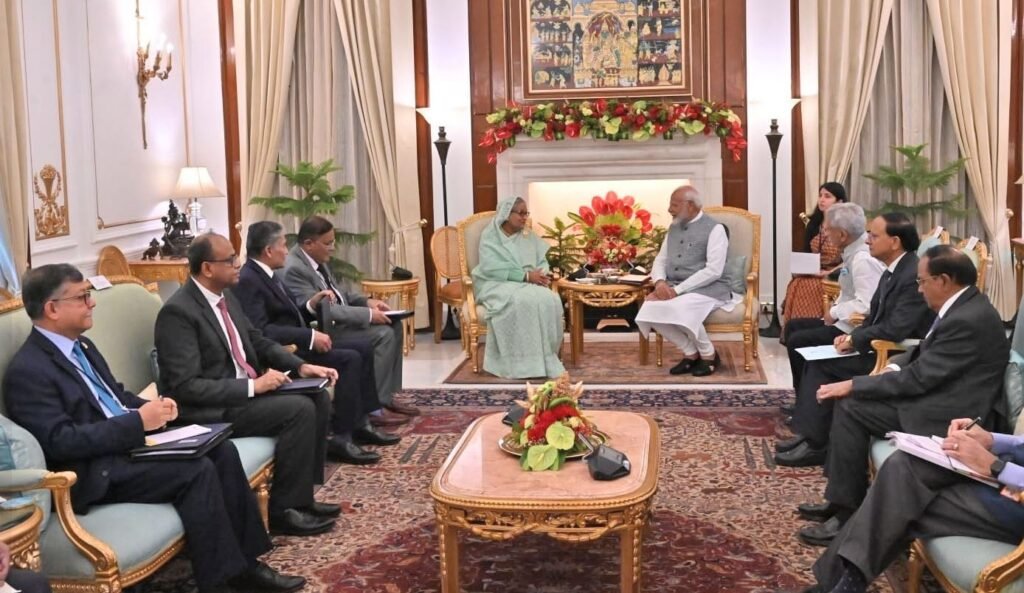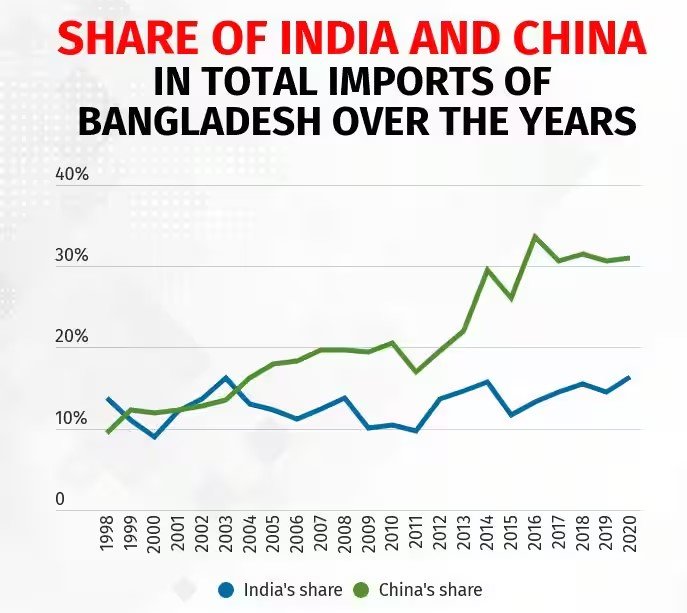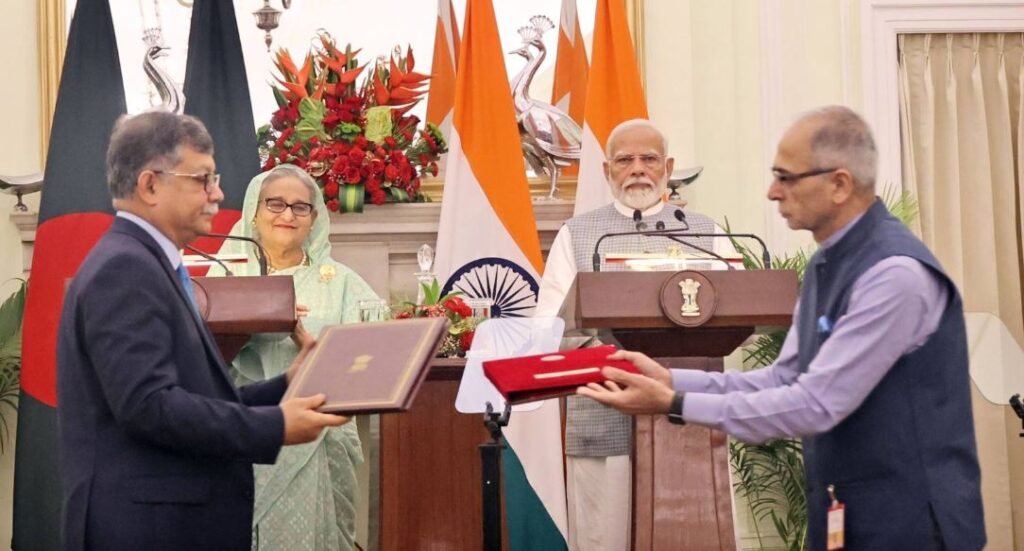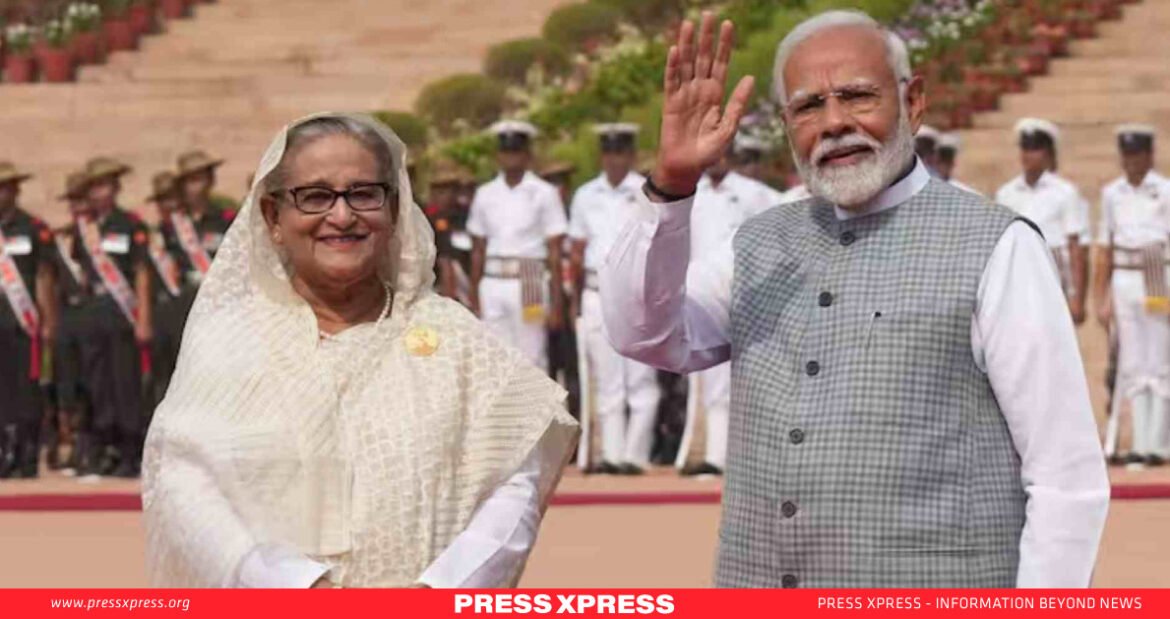In a notable diplomatic maneuver, Prime Minister Sheikh Hasina holds a bilateral meeting with Indian Prime Minister Narendra Modi on Saturday, marking her second visit within a fortnight. This swift succession of trips to New Delhi underscores the significance of India in Bangladesh’s foreign policy, particularly as Sheikh Hasina prepares for a consequential state visit to China in July.
The leaders discussed strengthening historical ties, with India’s foreign ministry spokesman Randhir Jaiswal noting that the Bangladesh-India relationship exemplifies a successful regional partnership.
You Can Also Read: Modi, Hasina talks shine with signing of 10 new pacts
Sheikh Hasina called the meeting ‘very productive’, stating that both countries agreed to work together for mutual benefit. She emphasized India’s role as a ‘major neighbor, trusted friend, and regional partner’ for Bangladesh.
Key Issues During the Visit
India is Bangladesh’s second-largest Asian trade partner, while Bangladesh leads as India’s top South Asian trade partner. In 2022-23, Bangladeshi exports to India reached about $2 billion.

The nations collaborate on policies and anti-corruption efforts, drug trafficking, counterfeit currency, and human trafficking.
On June 22, Dhaka and New Delhi signed 10 agreements in New Delhi, including three renewed MoUs. These cover areas such as blue economy, oceanographic research, fisheries, disaster management, health, space, and military education. Sheikh Hasina and Modi’s talks covered diverse topics from economic partnerships to regional security. Key points included the Teesta Special Economic Zone development and the Ganga Water Sharing Treaty renewal, addressing infrastructure, environment, bilateral trade, and resource management.
Delhi, Dhaka, Beijing triangle
Prime Minister Sheikh Hasina’s visit to India showcases Bangladesh’s strategic effort to balance relationships with regional powers India and China. This diplomatic move reflects Dhaka’s acute awareness of its geopolitical position.

India’s Prime Minister Modi, in his third term, is hosting Hasina, signaling India’s high regard for its eastern neighbor. Bangladesh’s urgency in arranging this meeting before Sheikh Hasina’s China trip underscores Dhaka’s intent to reassure New Delhi of continued partnership, even as it engages with Beijing’s expanding Belt and Road Initiative (BRI).
China’s proposed $1 billion Teesta River development project has raised security concerns in India due to its proximity to the border.
In her upcoming China visit, Sheikh Hasina will meet with Premier Li Qiang and President Xi Jinping. Chinese Ambassador Yao Wen described this visit as a potential ‘game-changer’, hinting at a new chapter in China-Bangladesh relations. He emphasized the importance of a China-Bangladesh free trade agreement (FTA) for achieving Bangladesh’s Vision 2041.
The proposed FTA would cover trade in goods and services, investment, e-commerce, and high-tech industry cooperation, providing a framework for future economic collaboration.
China has been Bangladesh’s largest trading partner for 13 consecutive years, with bilateral trade reaching $24 billion in 2023. China’s FDI stock in Bangladesh hit $3.2 billion by 2023, making it the second-largest investor. Chinese firms have significantly contributed to Bangladesh’s infrastructure, constructing railways, roads, bridges, and power plants.
Beijing has invested $4 billion in BRI projects in Bangladesh, with plans for over $50 billion in the coming years.

However, India cautions Bangladesh about China’s economic influence, citing examples of economic crises in Pakistan and Sri Lanka following Chinese investments. India also highlights Bangladesh’s growing trade deficit with China, which stands at nearly $21 billion.
Delhi is closely observing Dhaka’s balancing act with Beijing, warning that China might impose stringent compliance demands on Bangladesh. How Sheikh Hasina navigates this complex geopolitical triangle while prioritizing Bangladesh’s interests remains to be seen, though she has demonstrated skill in managing such challenges before.
It’s Not a Zero-Sum Game
International relations experts, however, believe that relations with India or China need not be a zero-sum game.
“We should transform geopolitical conflict into geopolitical cooperation,” Prof Imtiaz Ahmed of Dhaka University said, adding that we always see it as a zero-sum game. But India and China have good relations in several areas. They work together on BRICS, Russia-Ukraine issues, and many more. Even India’s trade with China also increased. Then why cannot we cooperate here together?
Prof Shahab Enam Khan, at the Department of International Relations of Jahangirnagar University, also believes that none of the countries are “either-or” options for Bangladesh.
“India, the US, and China each have unique and different roles in Bangladesh. It would be rational if Bangladesh’s relations with other countries were seen independently,” he said.
“Hence, seeing Bangladesh-China ties from myopic geopolitical or strategic interests won’t positively affect Bangladesh’s economy and security interests. Practically speaking, Prime Minister Sheikh Hasina’s visits to Delhi and Beijing reflect different priorities for the government,” the JU professor added.

Defense and Connectivity: A Broader Canvas
Defense and connectivity are key areas of focus, with discussions around a joint military exercise and the utilization of India’s $500 million line of credit to Bangladesh. The two leaders reviewed the progress of ongoing developmental projects, which include crucial road, rail, and connectivity initiatives aimed at bolstering bilateral ties.
This meeting also serves as a platform for Modi and Hasina to assess the deteriorating security situation in neighboring Myanmar, where government troops have faced significant defeats at the hands of anti-junta resistance forces.
The Road Ahead
Prime Minister Sheikh Hasina’s visit to India is more than a diplomatic engagement; it is a strategic statement of intent. As Bangladesh walks the tightrope of regional diplomacy, this visit is being closely watched for signals on how Dhaka plans to navigate its complex relationships with both India and China. With critical discussions on defense, economic cooperation, and regional security, the outcomes of this visit could have far-reaching implications for South Asia’s geopolitical landscape.
AidData, housed at William & Mary’s Global Research Institute in Virginia, also said that Bangladesh will likely remain ‘a key battleground for great power competition’ in the coming years given its unique locational position and recent geopolitical trends.
As Bangladesh tactfully maneuvers between the influential pulls of India and China, Prime Minister Sheikh Hasina’s visit to New Delhi is a pivotal moment in the nation’s foreign policy narrative. The meeting’s success could set a precedent for balanced regional engagement, potentially reconfiguring the geostrategic environment of South Asia. For both Dhaka and New Delhi, the stakes have never been higher, and the world will be watching closely.
The mutual visits between Modi and Hasina highlight the interwoven destinies of India and Bangladesh. Modi’s forthcoming trip to Dhaka, at Hasina’s invitation, symbolizes the continuing dialogue and cooperation that both nations are committed to pursuing. This visit will not only be an opportunity to strengthen bilateral ties but also to address shared regional challenges and economic interests.


